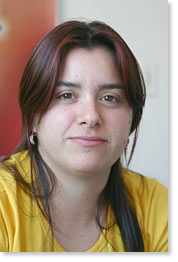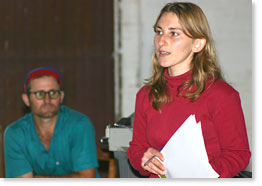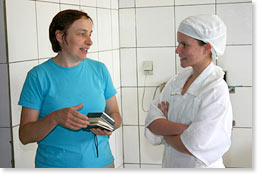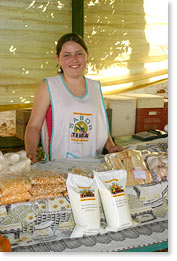|
Interview with Severine Macedo
Youth Representative of FETRAF-SUL Independent Alternatives for Rural Youth Chapecó, Santa Catarina, Brazil
Through its organizing, FETRAF-SUL has developed networks of economically autonomous farmers (union and non-union) building on-the-farm agro-industries. The farmers add value to their farm products with the agro-industries, taking the transformed products all the way to market. In addition to this, FETRAF has negotiated as a union with the government for credit, housing, and education. (Click here to read an interview with Altemir Antonio Tortelli, general coordinator of FETRAF-SUL.). This interview with Severine Macedo was conducted on August 29, 2004 in Chapecó, Santa Catarina, Brazil, and later edited, by Nic Paget-Clarke for In Motion Magazine with simultaneous translation by Agnes Vercauteren, officer for international relations of FETRAF-SUL.
In Motion Magazine: What work do youth do within FETRAF? Severine Macedo: We have organized a hundred associations of young farmers to get access to the land. We are also developing programs to build the capacity of these young farmers to produce when they get the land, usually from their parents. How to survive. How to produce and to get an income. We have two pilot projects with two associations of young people -- one in agro-tourism in Rio Grande Do Sul and the other with milk here in Santa Catarina. Next year, independent from the land credit program, we will implement in each state two more production pilot projects to show that it is possible that young people can survive, can have a good income on the land. All these pilot projects, they are new, they are a challenge to work on local development and to involve parents, but also they are coordinated by the young people. These are very concrete implementations of access to land, together with productive organization. A second thing we are doing is a special credit program for youth within the PRONAF program (National Program for Family Agriculture). And, thirdly, we are involved in a governmental policy on educational programs with Terra Solidaria, a project of FETRAF. We are discussing and implementing educational programs especially for youth -- access to university, access to technical capacity-building programs. At this moment, there is a large debate within the Brazilian society about youth. There are so many youth and there is no special policy towards the situation of the youth here and, within the youth, the rural youth are not mentioned at all. So, we have had a lot of discussions on the regional and national level to put forward questions, especially from the rural youth, to vindicate special policies towards this segment of society, to get Brazilian society to know that this segment wants to stay, to have a future on the land. For this, we are participating in public spaces where you have society and the government together -- not only in civil society, but in councils where we can participate and put clearly the demands of the rural youth from all Brazil, not only from the South. In Motion Magazine: What percentage of the Brazilian population are under thirty? Severine Macedo: Thirty-four million are youth between 15 to 24 years. 20% of Brazilians are in this age spread. In Motion Magazine: So, what is the situation with rural youth in Brazil? Severine Macedo: First, never in Brazilian history has there been a policy towards Brazilian rural youth. And, what is happening to Brazilian agriculture is happening to Brazilian youth. The rural youth have an anxiety. If there is no solution soon they will leave the countryside. They don’t have access to land. There is no credit, no credit capacity building. If that is not solved in a short time, they will go away. The media, school, everyone is telling the youth, “The best you can do is go to the city.” When you add to this that there is no financial stability in the small properties, the youth they are leaving. The other thing I want to tell you is that we are reacting against this situation. We are not waiting for the solution to come from outside. We are reacting and struggling to get a life in the countryside. We don’t want people to look to us and say, “You have no future. There are only problems.” Our youth is reacting against this. We want to live in the countryside. The youth want to make options and not be pushed to leave the countryside or pushed to stay at home. We want to have the option to choose the rural life or the urban life. We want the conditions to be able to choose our future, and not, for economic reasons, be obligated to leave the countryside. We are working in two ways. On the one hand, implementing concrete experiences to create the possibility to live in the countryside. And, on the other hand, developing recognition of an important segment of the rural population. Recognition that we are able to do something; that we are important for the movement; that we are important for the future of the rural areas. We are not to be seen as just future farmers, future politicians. We do not have the experience of life, but we are acting now and these actions are important at this moment. That is why a lot of youth are taking part in the boards of the local organizations, acting in politics, acting in a political way. Implementing proposals within society In Motion Magazine: Do you see yourselves as making a society where you truly have a role in how that society works? Are you building a democracy? Severine Macedo: In the past, the idea put to us was that to be a democratic society is to have the right to vote, and the rights of a citizen. But we think it has to go further than that. Democracy is not only in relation to the government. Democracy is the possibility to interact in society and to change things: so that civil society can organize; so that organized civil society can have the possibility to implement its proposals. That is also democracy. There must be a relationship with the government but also the possibility to implement your proposals within society. Brazilian society has moved towards democracy but democracy a lot of the time is a masquerade. We are consulted. Civil society is consulted. But the decisions are just taken. It is difficult. We are constructing this process. In Motion Magazine: If the projects that you are involved in in the community are a form of sustainable development, do think that the creation of that sustainable development in an autonomous way is a way to build democracy? Severine Macedo: No doubt. If we don’t have these alternatives we are totally dependent on the great corporations. We have no choice if we are to be independent. We must build up (these alternatives) in our hands, where we have the control of the chain (of production). That is the basic point to having more democracy: to have more choice, more participation. In Motion Magazine: Do you think that will develop into human rights and political rights? Severine Macedo: It cannot be limited to the economic part. We have also to discuss within this process social relations, exclusions, the marginalized groups, the cultural situation. For example, the relationships between woman and man, between youth and the old generation. All these kinds of themes have to be included in this process. In Motion Magazine: And are they? Severine Macedo: It is not easy. We have made some steps. The youth, especially, are bringing these themes into the discussion. But still there is so much machismo and this translates into the situation of the youth and family agriculture. You are dependent on the decision of the father figure in agriculture. It is difficult to change this kind of culture of 500 years. In ten years you can’t change that. For example, if FETRAF is organizing some event about cooperativism and they call on the people who are to speak, mostly they are men. But we have started this process of change. That’s why we don’t want a separated organization of the rural youth, nor the rural woman. We want to be integrated, participating in the whole process. We are putting all our energy to build up the whole structure, as Tortelli has explained. We want to be there as members equal with the men, the male farmers. We want to be there with the same rights, the same possibilities. That’s the condition to get real change in the old system -- the participation of youth, of female farmers, within the whole system. You have to construct and you have to put forward the specific demands of rural youth, of female farmers. But they have to be put on the whole structure, on the whole process. Published in In Motion Magazine July 30, 2005 Also see:
|
||||||||||||||||
If you have any thoughts on this or would like to contribute to an ongoing discussion in the  What is New? || Affirmative Action || Art Changes || Autonomy: Chiapas - California || Community Images || Education Rights || E-mail, Opinions and Discussion || En español || Essays from Ireland || Global Eyes || Healthcare || Human Rights/Civil Rights || Piri Thomas || Photo of the Week || QA: Interviews || Region || Rural America || Search || Donate || To be notified of new articles || Survey || In Motion Magazine's Store || In Motion Magazine Staff || In Unity Book of Photos || Links Around The World NPC Productions Copyright © 1995-2018 NPC Productions as a compilation. All Rights Reserved. |





